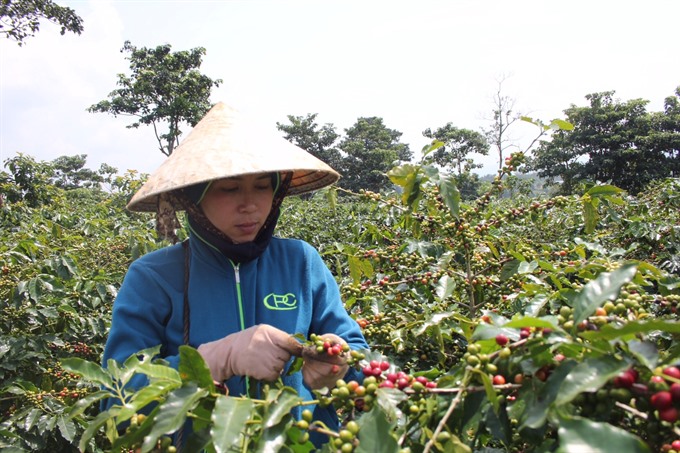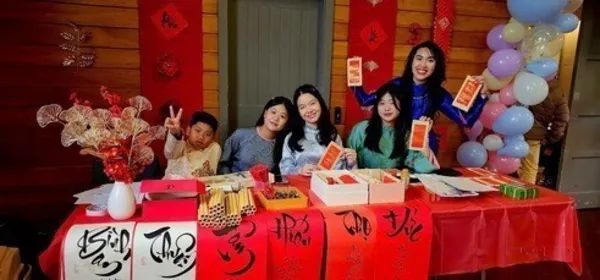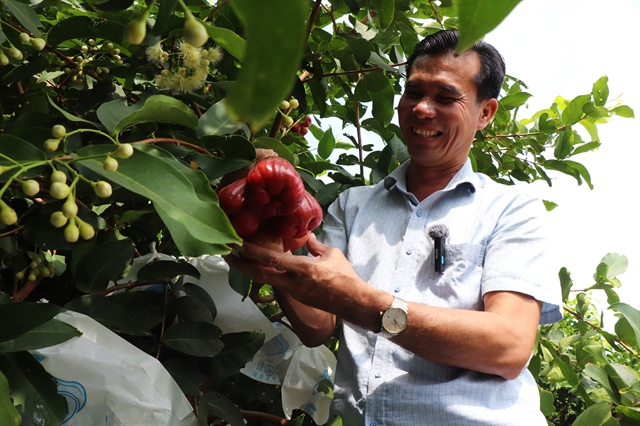

Many people are poor in Quảng Trị Province. However, things are changing as the ruins of an old battlefield are becoming covered with plant growth.
 |
| A farmer harvests coffee in a plantation in Khe Sanh. Green colour returns to the former battlefield thanks to efforts of local veteran soldiers. Photo courtesy of Yên Mã Sơn |
Many people are poor in Quảng Trị Province.
However, things are changing as the ruins of an old battlefield are becoming covered with plant growth.
People who were once fighting are now farming.
They are also planning to make their province a place for tourists to visit, especially the place where the Battle of Khe Sanh took place.
by Huê Phong
Over 50 years after the war, the devastated battlefield of Khe Sanh has become an economic hub of the poor central province of Quảng Trị, with average annual income per capita of US$1,400.
According to the People’s Committee of Khel Sanh Town, the town’s living standards have transformed completely since the post-war era.
“The town is growing into a developed urban zone and we hope to reach annual income per capita of $1,900 in 2020, thanks to the focus on the development of trade and tourism,” says Hoàng Văn Quynh, the committee’s chairman.
A report by the committee said the local residents’ education has increased year after year, while the health care system works effectively, with a doctor present in every commune in the town.
Greenery covers all land areas and vestiges of war-time bombing are rarely seen in the town. The return of the green trees, along with the mild weather and the plenty of red basalt soil in the town, have sparked hopes that it could become a tourism destination and clean agriculture.
Hoàng Hữu Cảm, a local who runs a hotel business in the town, says a tourism boom seems on the cards, thanks to the town’s location on the East West Economic Corridor, which runs through five Southeast Asian countries of Myanmar, Thailand, Cambodia, Laos and Việt Nam.
“Khe Sanh is the ideal stop for visitors from the countries who go through the nearby Lao Bảo and La Lay border checkpoints,” Cảm says. The border gates sit between the town and Savannakhet Province of Laos. They also facilitate trade to and from the town.
Hồ Xuân Hiếu, a businessman who owns a cassava starch brand, says the fertile soil in the town yields a pure flour. Cassava grown in the town produces 70 tonnes of starch each year, which is supplied to Japan and South Korea.
The return of greenery to the town cost the blood and tears of local soldiers who fought in the battle of Khe Sanh for five months from January 14 to July 9, 1968.
Hồ Mơ left his soldier’s life to return to the town in 1980, when the remnants of the war were everywhere and the town was in disarray. Mơ started to clear a valley five kilometres from the centre to take soil for cultivation.
Thanks to his efforts, rice began to grow well in the soil within a month. By 2005, Mơ became one of the top farmers in the town. He had rice paddies, a plantation of rubber trees and a big herd of cows and water buffalos.
Since 2005, Mơ has earned around US$13,000 a year. Besides cultivating his seven hectares of farm land and his husbandry work feeding 50 cows and buffalos, the 80-year-old man has volunteered to protect 53 hectares of community forest from illegal hunters and loggers.
“At my 18, I joined the North Việt Nam military volunteer and worked as a porter carrying necessities and weapons to assist the battles in Làng Vây and Tà Cơn airport,” says Mơ.
Hồ Ta Chê, another veteran, says joining the liberation force in the past and working for the greenery of the town today are all part of his responsibility to his hometown.
Younger than Mơ, Chê worked as a liaison boy for the troops and later dug secret tunnels that led army tanks into Làng Vây battlefield.
Chê lost his right hand in 1967 after a bombardment by American airforce. However, losing one hand did not mean losing all his power. After the war, Chê fertilised the soil for rice cultivation and became one of the biggest rice producers in the town.
The veterans have determined that once their hometown grows to be a tourism hub of the province, they will be the best tour guides for itineraries related to the famed Battle of Khe Sanh, where over 100,000 tonnes of bombs were dropped by US aircraft and over 158,000 artillery rounds were fired in defence of the base. — VNS
GLOSSARY
Over 50 years after the war, the devastated battlefield of Khe Sanh has become an economic hub of the poor central province of Quảng Trị, with average annual income per capita of US$1,400.
Devastated means destroyed.
A hub is a place where there are a lot of activities of people coming from other places and going to other places.
Annual means “every year”.
Income is money that is earned.
Per capita means “for every person”
According to the People’s Committee of Khe Sanh Town, the town’s living standards have transformed completely since the post-war era.
Transformed means changed from one thing into something else.
Post-war means “after the war”. An era is a period of time.
“The town is growing into a developed urban zone and we hope to reach annual income per capita of $1,900 in 2020, thanks to the focus on the development of trade and tourism,” says Hoàng Văn Quynh, the committee’s chairman.
Urban means to do with a town or a city.
A report by the committee said the local residents’ education has increased year after year, while the health care system works effectively, with a doctor present in every commune in the town.
Residents of a place are people who live there.
If something works effectively, it works okay.
If a doctor is present in every commune, there are doctors in the communes. In other words, they are there and not somewhere else.
Greenery covers all land areas and vestiges of war-time bombing are rarely seen in the town.
Vestiges of war-time bombings are signs that have been left behind after the attacks.
Rarely means “not often”.
The return of the green trees, along with the mild weather and the plenty of red basalt soil in the town, have sparked hopes that it could become a tourism destination and clean agriculture.
Basalt is a type of rock that comes from volcanoes.
A destination is a place to which people travel. A tourism destination is a place to which tourists travel.
Agriculture means farming.
Hoàng Hữu Cảm, a local who runs a hotel business in the town, says a tourism boom seems on the cards, thanks to the town’s location on the East West Economic Corridor, which runs through five Southeast Asian countries of Myanmar, Thailand, Cambodia, Laos and Việt Nam.
If a tourism boom is “on the cards”, it is something that is likely to happen because of the way things have been planned.
They also facilitate trade to and from the town.
To facilitate trade means to make it possible, and easy, for trade to take place.
Hồ Xuân Hiếu, a businessman who owns a cassava starch brand, says the fertile soil in the town yields a pure flour.
A brand is a type of product made under a certain company name.
Fertile soil is soil that is rich enough in nutrients to have plants growing in it.
Yields means “produces”.
Hồ Mơ left his soldier’s life to return to the town in 1980, when the remnants of the war were everywhere and the town was in disarray.
Remnants are “left overs”.
Disarray means chaos.
Besides cultivating his seven hectares of farm land and his husbandry work feeding 50 cows and buffalos, the 80-year-old man has volunteered to protect 53 hectares of community forest from illegal hunters and loggers.
Cultivating means preparing and using land for farming.
A hectare is a unit in which land is measured.
Husbandry means animal farming.
To volunteer means to offer to do work for no payment.
“At my 18, I joined the North Việt Nam military volunteer and worked as a porter carrying necessities and weapons to assist the battles in Làng Vây and Tà Cơn airport,” says Mơ.
A porter is someone who carries something.
To assist means to help.
Hồ Ta Chê, another veteran, says joining the liberation force in the past and working for the greenery of the town today are all part of his responsibility to his hometown.
A veteran is someone who was once a soldier.
Younger than Mơ, Chê worked as a liaison boy for the troops and later dug secret tunnels that led army tanks into Làng Vây battlefield.
Liaison is the work that involves getting people to talk to one another so that they can work together.
The veterans have determined that once their hometown grows to be a tourism hub of the province, they will be the best tour guides for itineraries related to the famed Battle of Khe Sanh, where over 100,000 tonnes of bombs were dropped by US aircraft and over 158,000 artillery rounds were fired in defence of the base.
Determined means “worked out”.
An itinerary is travel plan.
Artillery is made up of heavy weapons that throw out large shells.
WORKSHEET
State whether the following sentences are true, or false:
© Duncan Guy/Learn the News/ Viet Nam News 2018
1. True; 2. True; 3. False; 4. True; 5. False.




